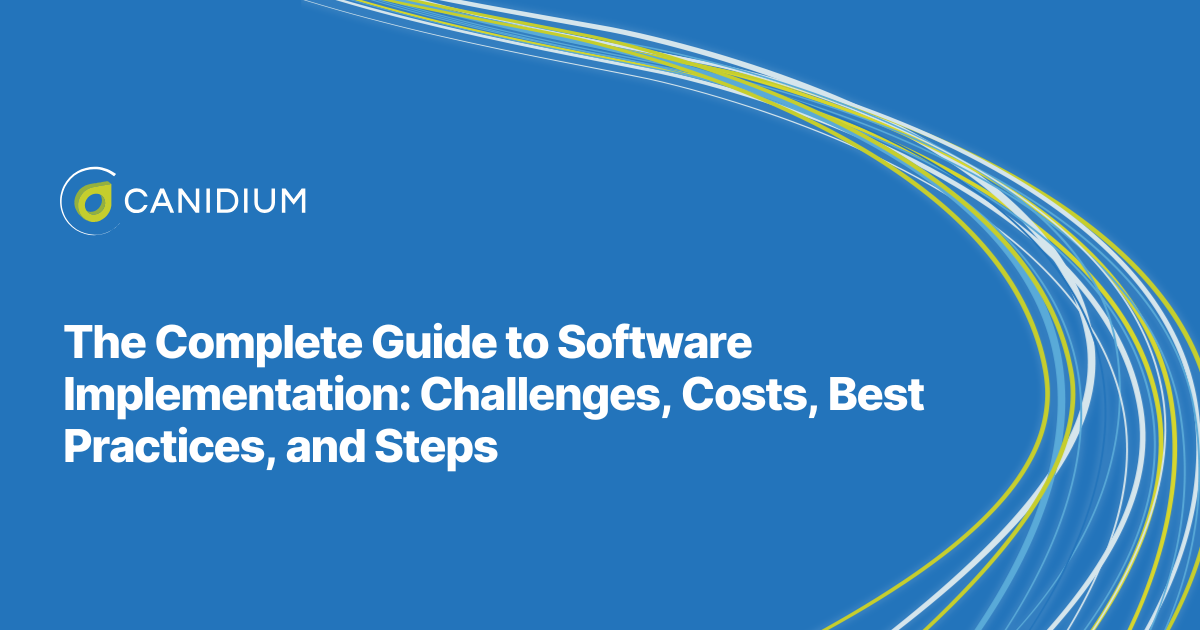Managing software solutions after implementation is a significant consideration. Software solutions are not a "set it and forget it" situation. A reliable safety net can make all the difference between success and struggle.
This is where Canidium, a leading software implementation partner, stands out, focusing on managed services and flexible contract options. By offering clients the support they need precisely when needed, Canidium empowers businesses to navigate the complexities of software implementation confidently.
In this article, we will explain:
- The benefits of managed services
- The benefits of contract flexibility
- The differences between managed services contracts and retainer contracts
Managed Services Benefits: Comprehensive Support Tailored to Your Needs
Managed services go beyond traditional support models by providing clients with a dedicated team of experts who are committed to ensuring the success of their software implementation projects. This team works closely with clients to understand their unique needs and challenges, providing personalized solutions that drive efficiency and productivity.
Personalized Solutions for Maximum Efficiency
One of the most notable benefits of managed services is the ability to tailor solutions to meet each client's specific requirements. Whether a client needs technical support, training, or ongoing maintenance, a software implementation partner can provide the necessary support. This personalized approach ensures that clients receive the support they need when needed, improving efficiency and productivity.
Scalability for Business Agility
Another advantage of managed services is the ability to scale resources up or down as needed. This flexibility lets clients respond quickly to changing business conditions, ensuring their software implementation remains on track. Whether facing unexpected challenges or planning for future growth, managed services provide the agility and scalability businesses need to succeed in today's dynamic environment.
Cost-Effective Solution
In addition to providing comprehensive support, managed services can help clients reduce costs. BClients can save on hiring and training expenses by eliminating the need for in-house resources, such as dedicated IT staff; additionally, by leveraging a software implementation partner’s expertise and resources, clients can avoid costly mistakes and delays, leading to a more cost-effective software implementation process.
Access to Top-Notch Expertise
Managed services provide clients access to top-notch software implementation expertise. Your software implementation partner should provide experts with extensive experience in various industries and technologies, ensuring that clients receive the highest level of support and guidance throughout the implementation process.
Managed services offer clients a comprehensive and personalized approach to software implementation support. With a dedicated team of experts, scalability, cost-effectiveness, and access to top-notch expertise, managed services provide the support and flexibility businesses need to succeed in today's competitive marketplace.
Contract Flexibility: Meeting Clients on Their Terms
Every client is unique, with their own set of requirements and constraints. That's why Canidium offers flexible contract options that can be customized to meet the client's specific needs. Whether a client requires a short-term or long-term partnership, a good software implementation partner can tailor a contract that fits their needs and budget.
Customized Contract Options
Flexible contract options allow clients to choose the duration and scope of services that best suit their needs. Whether a client needs support for a specific project or ongoing maintenance, your software implementation partner can create a contract that aligns with their requirements. This customization ensures that clients receive the support they need when they need it without paying for services they do not require.
Scalable Support Levels
The flexibility of managed contract options extends to the level of support provided. Whether clients need basic technical support or comprehensive project management, your software implementation partner can tailor a contract that meets their needs. This scalability allows clients to adjust their support levels as required, ensuring they have the right level of support throughout the software implementation process.
Budget-Friendly Solutions
In addition to offering flexible contract options, your software implementation partner can provide budget-friendly solutions for their clients. By customizing contracts to meet each client's specific needs, clients can achieve their goals without exceeding their budget. This commitment to affordability ensures that clients receive high-quality support at a competitive price.
Partnership Approach
A partnership approach to contract flexibility allows software implementation partners to work closely with clients to understand their needs and goals. This collaborative approach allows implementation partners to create contracts that meet each client's unique requirements, fostering a strong and mutually beneficial relationship.
Flexible contract options allow clients to receive the support they need when they need it without paying for services they do not require. With customized contract options, scalable support levels, budget-friendly solutions, and a partnership approach, managed service contracts can meet clients where they are and help them achieve their goals.
Flexible Managed Service Contracts vs. Ongoing Retainers: Understanding the Difference
When considering support options for software implementation, businesses often choose between flexible managed service contracts and paying an ongoing retainer. While both options provide a level of support, key differences can impact the effectiveness and cost-effectiveness of each approach.
Scope of Services
Flexible Managed Service Contracts: With flexible managed service contracts, clients can tailor the scope of services to meet their specific needs. Clients only pay for their required services, allowing for greater flexibility and cost control. Additionally, clients can quickly scale services up or down as needed, ensuring they have the support they need when needed.
Ongoing Retainers: Ongoing retainers typically pay a fixed fee for a set level of support, regardless of the services rendered. While this can provide a sense of security, it may also lead to paying for unnecessary or underutilized services. Additionally, the scope of services included in an ongoing retainer may be more limited than in a flexible managed service contract.
Cost Structure
Flexible Managed Service Contracts: The cost structure of flexible managed service contracts is based on the specific services provided and the duration of the engagement. This means that clients have greater control over their costs and can adjust their support levels as their needs change. This can lead to cost savings over time, as clients are not locked into paying for services they do not require.
Ongoing Retainers: Ongoing retainers typically involve repeatedly paying a fixed fee, regardless of the services provided. While this can give predictability regarding costs, it may also result in higher overall costs, especially if the required support level fluctuates over time.
Flexibility and Scalability
Flexible Managed Service Contracts: Flexible managed service contracts allow clients to scale their support levels up or down as needed easily. This means that clients can respond quickly to changing business conditions and ensure they have the support they need when needed. Additionally, the flexibility of these contracts allows clients to explore new services or technologies without committing to a long-term engagement.
Ongoing Retainers: Ongoing retainers may offer less flexibility and scalability than flexible managed service contracts. Clients may find themselves locked into a fixed level of support, regardless of their needs. This can limit their ability to respond to changing business conditions and may result in paying for services that are not utilized.
While flexible managed service contracts and ongoing retainers offer support for software implementation, the key differences lie in the scope of services, cost structure, and flexibility. Flexible managed service contracts give clients greater control over their costs, the ability to tailor services to meet their specific needs, and the flexibility to scale support levels up or down as needed. This can lead to cost savings and improved efficiency over time, making it a preferred choice for many businesses.
Embracing a Safety Net with Canidium
By choosing Canidium as their software implementation partner, clients can rest assured that they have a reliable safety net. With managed services and flexible contract options, Canidium provides the support and flexibility businesses need to succeed in today's fast-paced environment. Whether facing unexpected challenges or planning for future growth, Canidium is there every step of the way, helping clients efficiently navigate the complexities of software implementation.
Canidium's focus on managed services and contract flexibility sets it apart as a trusted partner in software implementation. By offering clients a safety net they can rely on, Canidium empowers businesses to achieve their goals and drive success.
Now that you understand your post-implementation support options, your next step is to learn more about how managed services help boost solution success.
Read this article: Beyond Go-Live: 5 Ways Managed Services Ensure Software Success








